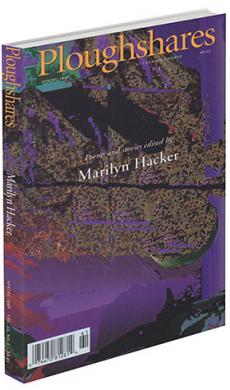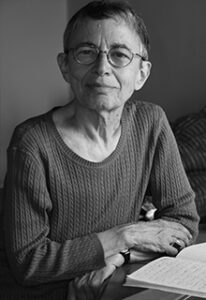rev. of Atlantis and Heaven’s Coast by Mark Doty
Atlantis
and
Heaven’s Coast
Poems and a memoir by Mark Doty. HarperCollins, $12.00 paper and $23.00 cloth. Reviewed by Diann Blakely Shoaf.
Mark Doty’s third collection,
My Alexandria, won the 1993 National Book Critics Circle Award, and his new volume of poems,
Atlantis, crowns its predecessor’s substantial achievements. Its mythical title notwithstanding, the realm of
Atlantis is fully human, subject to forces that make most things seem “fallen down, broken apart, carried away.” Yet among Doty’s notable strengths is his ability to celebrate this realm of grief and loss as a place that nonetheless offers an array of “gorgeous[ness].”
For instance, in “Crepe de Chine,” a poem that resonates with both splendor and trash, a drag queen, walking along a Manhattan avenue, becomes intoxicated by shop windows filled with giant bottles of perfume, then by the various glassed displays of pastries and flowers: “I want to wear it,” the speaker says of this lavish excess, “I want to put the whole big thing / on my head, I want . . . / / [to] take the little florists’ shops / and twist them into something / for my hair, forced spiky branches / and a thousand tulips.” In a world where signs of wreckage stain and fade a landscape increasingly depopulated by plague, and where so much is beyond our control, the conclusion’s campy defiance reverberates like a horn blown in a Renaissance court: “look at me built and rebuilt, / / torn down to make way, / excavated, trumped up, tricked out, / done, darling, / / in every sense of the word. Now, / you call me / Evening in Paris, call me Shalimar, / call me Crepe de Chine.”
Doty’s attentive eye is equally at home in the natural world; indeed, while in poems like “Crepe de Chine” and “Two Cities” he seems guided by the Elizabethan — drenched and urban soul of Hart Crane, in others he seems led by Elizabeth Bishop, perhaps the best observer of the Atlantic coast’s various forms of cold, clear knowledge. “At the Boatyard” even features the appearance of a “whiskered, placid” seal, an homage to Bishop’s twin and totem in “At the Fishhouses.” For Bishop and Doty, description is an ethos as well as an aesthetic, commanding us to honor otherness by lending it our full sensuous and “self-forgetful” concentration, as Bishop wrote of Darwin, before we begin to form conceptions. Perception and conception, nature and city, flower and frost — all these supposed opposites come together in the rich fusion and profusion of “Grosse Fuge.” Written after Cape Cod was visited in rapid succession by Hurricane Bob and a false spring, the poem contrapuntally weaves the storm’s aftermath, a friend’s
temporary recovery from AIDS-related dementia, and the experiencing of Beethoven’s late quartets. “What can you expect, in a world that blooms / and freezes all at once?” Doty asks at the end of the poem. The answer lies in the musical form itself, “this stream of theme and reiteration, statement / and return” which closes with no great pronouncement, simply a reckoning: “There is no resolution in the fugue.”
A partner’s death from AIDS is the core of the six-poem sequence that gives
Atlantis its title, and the core as well of Doty’s just-released prose memoir,
Heaven’s Coast. Its lyrical treatment of time, as well as the attention paid to the various chapters’ natural or urban settings — Cape Cod, Boston, New York, Vermont — link the memoir to
Atlantis in ways both frictive and enriching.
The affirmative notes struck in “Crepe de Chine” — “look at me built and rebuilt” — echo beneath the multiple and overlapping stories of loss in
Heaven’s Coast, but in the memoir these notes occur polyphonically rather than arising from a solo. For
Heaven’s Coast isn’t only Doty’s story; it’s the story of AIDS and the ravenous swath it has cut through his — and our — community. Against the disease’s hideous gaping hunger, Doty posits the imperfect but healing construct of friendship, the families we choose and make and remake and also find ourselves remade by. “It’s the drag queen’s perennial message, after all,” Doty says in one of the memoir’s final chapters:
“we’re all self-made here.”
Diann Blakely Shoaf is a regular reviewer for the “Bookshelf.” Her collection of poems, Hurricane Walk,
was published by BOA Editions in 1992.

